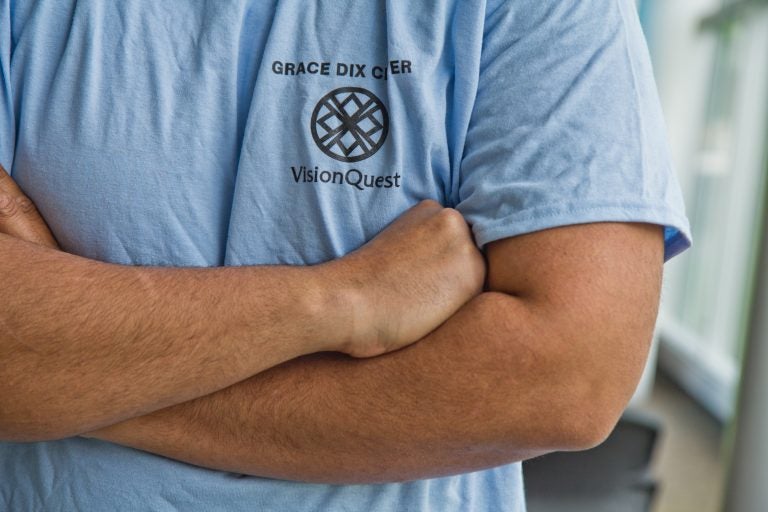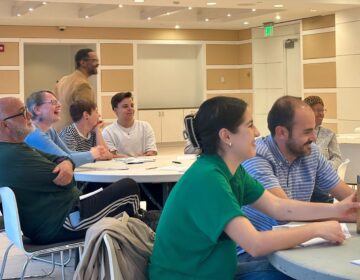VisionQuest employees: ‘It’s not safe for us … How would it be safe for the kids?’
Five staffers describe a lack of training, hostile work environment at VisionQuest. The company wants to open a 60-bed facility for unaccompanied immigrant youth in Philly.
Listen 1:31
One of four current VisionQuest employees who described a lack of training and a hostile work environment. The company wants to open a 60-bed facility for unaccompanied immigrant youth in North Philadelphia. (Kimberly Paynter/WHYY)
Updated: 2:15 p.m.
—
On March 27, the employees of VisionQuest presented a united front.
Sitting together during a contentious four-hour community meeting in North Philadelphia, they cheered on their employer and asked for a chance to work with the growing number of immigrant children arriving at the U.S. border.
Some tearfully vowed to do better than the last time VisionQuest ran a group home in the same Logan Plaza building. The city of Philadelphia shut down that program in 2017, after state inspectors documented incidents of staff physically and emotionally abusing children in their care.
Four current employees and one former staffer say following that show of positivity, their confidence in VisionQuest’s Grace Dix Center has plummeted. They blame a hostile work culture rife with verbal discord and threats of violence between staff, and a lack of job-specific training. WHYY has agreed to withhold their names because they fear speaking out could cost them their jobs or hurt their prospects of finding other work.
VisionQuest is currently in the midst of a zoning battle with the city over what’s permitted on the property. A Common Pleas Court judge has not yet ruled as to whether the facility should be allowed to accept residents while it appeals an initial denial by the city’s Zoning Board of Adjustment. The state of Pennsylvania has also not yet issued VisionQuest the license required to operate.
“It’s not safe for us right now,” said a youth care worker currently employed by the company. “How would it be safe for the kids?”
Employees describe hostile work environment
In the last six months, 40,000 unaccompanied immigrant children and youth fleeing violence and poverty in Central America have crossed the U.S. southern border and entered the custody of the federal government. Along with children separated from their parents under the Trump administration’s “zero tolerance” policy, they are in the care of the U.S. Office of Refugee Resettlement, or ORR, until they can be placed with a family member, or they turn 18.
The federal agency, in turn, contracts with a web of for-and non-profit service providers, such as Arizona-based VisionQuest, to shelter, educate, and vet family members suitable for sponsorship.
At the Grace Dix Center at 5201 Old York Road, VisionQuest plans to house 60 teenage immigrant boys who crossed the U.S. border illegally or presented themselves at a port of entry. Not a shelter and not a detention center, the facility is what’s called “staff secure,” a kind of medium-risk placement for boys as young as 12 who are deemed flight risks, have suspected gang involvement, or have had disciplinary incidents at another ORR shelter.
In such a facility, high numbers of staff are employed to provide round-the-clock supervision. Problems among these same staff drive many of the whistleblowers’ concerns.
The four current employees say when they started at VisionQuest, they had high hopes of making a difference, of working with vulnerable children amid the highly polarized U.S. immigration debate.
“I took a pay cut to work with company,” said one woman. Instead, she said, creeping disappointment slowly turned to fear.

All five current and past employees describe witnessing a range of unprofessional behavior, from verbal threats of violence between staff to heated arguments where staff members had to be physically separated.
The causes of the conflicts appear benign. Egos clash over who is in charge of a workshop, until someone storms out. A perceived slight escalates into a verbal altercation. Beefs between people who know each other outside of work spill into their nine-to-five.
In one instance, three employees described a youth care supervisor confronting a case manager, saying she spread a rumor about him, and threatening that if they weren’t at work, they would handle it differently. Witnesses say they took this to mean resorting to physical violence.
Another staffer who had threatened some female employees was later laid off, but then returned to the facility to pick up his paychecks, making at least one employee feel unsafe.
VisionQuest Director James Smith said he could not comment on allegations against specific employees.
In another incident, when a group of staff had assembled for a training, one employee told WHYY she heard a youth care worker talking to her female friend about being threatened by a male coworker.
The friend responded, “You don’t have to worry about that because I’m carrying this,” pulling out and discharging a stun gun. She was suspended for a few days before returning to work, according to Smith.
“The stun gun was not considered a weapon,” said Smith. “Although pretty much anything could be used as a weapon … staff are not allowed to bring anything of the sort into our environment.”
Smith said after the incident, VisionQuest installed lockers to store personal items in the basement. Pennsylvania regulations for child residential facilities forbid the presence of firearms or weapons, except those carried by law enforcement.
‘Someone is going to get hurt’
In addition to the threats, all five employees said concerns raised internally were dealt with haphazardly and with differing results.
When former employee Carmen Pagan spoke to The Philadelphia Inquirer about hostility toward Spanish speakers, VisionQuest adopted a policy codifying that staff could speak their native language. At least three others told WHYY they had also raised complaints about threats and unprofessional conduct to Smith, who they said did not take disciplinary action.
“They stopped documenting because everybody was threatening everyone,” said the former VisionQuest employee. Smith said no threats had been brought to his attention.
“We try to ensure that anything that is brought to our attention has been addressed,” said Smith. “Now, can I guarantee that every person is happy with the outcome or my decision? No.”
In some cases, the director said, conflicts were dealt with in “the circle,” VisionQuest’s Native American-inspired meeting style. Each meeting opens with a hug and the phrase, “What goes around comes around,” per a description on VisionQuest’s website. Employees sit or stand in a circle, “facilitating open and honest communication.” Sometimes a feather is passed, to indicate who has the floor.
The employees also said they struggled to receive adequate job training, particularly on the federal and state standards for childcare centers.
After workshops on VisionQuest’s philosophies and a kind of trauma-informed care called the Sanctuary Model, three employees described teaching themselves from a manual ORR has online about working with “unaccompanied alien children.”
Employees also said they have not received enough training on the paperwork they would have to fill out or how to do things such as spot a fake passport or birth certificate, which is part of the work they would be doing to unite the children with their family members.
“I don’t know everything I need to do my job,” said a VisionQuest staffer.
Smith refuted that characterization, saying staff had visited another ORR shelter near Bethlehem, and that VisionQuest had flown in staff from its other locations to train new hires in Philadelphia.
All five employees said they felt the facility was currently unprepared to accept children.
“You can only imagine once the kids are here, once the stress level gets amplified … someone is going to get hurt,” said a male staffer.
Smith said staff “frustrations” are in fact due to not having children in the facility, so employees could not do their jobs.
“We’ve been in there since January and for whatever reason the facility has not been allowed to open,” he said.
VisionQuest currently has 59 employees at the Grace Dix Center, according to a spokesperson.
Company exploring other locations amid legal battle
All levels of government are responsible, to some degree, for ensuring that kids in places like the VisionQuest Grace Dix Center are in a safe environment.
ORR has strict policies about monitoring its contracts with private companies. The agency did not grant a request for an interview, but sent a general statement saying the agency “provides consistent oversight of all components of a care provider’s program, including program design, management, services, safety and security, child protection, case management, personnel management, stakeholder relations, and fiscal management.”
Robert Carey, who spent two years as the ORR director during the Obama administration, said he found the allegations by staff at VisionQuest “concerning.”
“That’s the environment into which vulnerable children are being placed,” he said.
Watchdog organizations say that federal oversight can be opaque and reports on compliance with regulations are not published.
“The public doesn’t know if there are shortcomings [in these facilities] or if any of the shortcomings have been addressed,” said Jennifer Podkul, Senior Director of Policy and Advocacy with Kids in Need of Defense, a legal aid organization that provides representation to children in shelters similar to the one proposed by VisionQuest.
State governments also monitor the childcare facilities under their purview, sometimes raising serious concerns about mistreatment.
Last year, an investigation by Reveal/Center for Investigative Reporting and the Texas Tribune found that ORR continued to award grants to private contractors after state government agencies slapped them with serious violations. Millions of taxpayer dollars continued flowing to companies where staff members had been convicted of sexual abuse or cited for failing to seek medical attention for children.
On Thursday morning, Philadelphia Common Pleas Court Judge Paula Patrick heard arguments on whether VisionQuest would suffer “irreparable harm” if it could not start housing minors. She did not rule from the bench, but grilled the city of Philadelphia about the reasons for it issued a zoning violation against the company in the first place.

VisionQuest is also exploring alternate locations near Philadelphia, such as on the grounds of the Norristown State Hospital.
If that happens, the four current employees say they’ll probably quit. All are currently applying for other jobs.
—
This story has been updated to reflect that a Common Pleas Court judge has not yet ruled as to whether the facility should be allowed to accept residents while it appeals an initial denial by Philadelphia’s Zoning Board of Adjustment.
WHYY is your source for fact-based, in-depth journalism and information. As a nonprofit organization, we rely on financial support from readers like you. Please give today.




